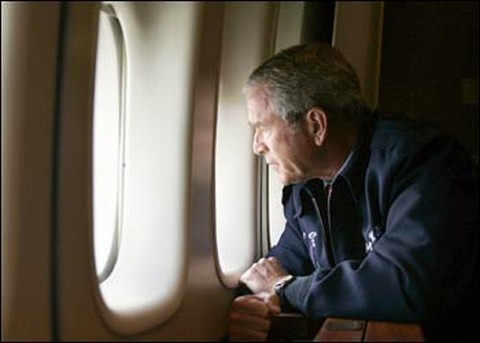What Happened: Inside the Bush White House and Washington’s Culture of Deception by Scott McClellan is the second book that we are reviewing in an informal exploration of the Bush Presidency and contemporary history. As opposed to the previous review of Frum’s account of the White House, which was pro-Bush, McClellan’s account is, at times, highly critical. It was published in 2008 and became a bestseller because of the fact that McClellan was notable for being one of the few inside Bush’s cabal to break ranks and criticize the Presidency. To be fair, most of the criticism in the book is not directed so much at Bush than the people he surrounds himself with.
McClellan was hired by Karen Hughes, Bush Communication Director, when Bush was still Governor of Texas. McClellan details his early political career and the opportunity to join Bush in the White House as Deputy Press Secretary, before taking over or Ari Fleischer in 2003. McClellan would eventually “resign” or be forced out, depending on perspective, in 2006. The book details most of the Bush Presidency but is focused on the following issues: the evidence presented to the public to justify a pre-emptive war in Iraq, the Valerie Plame leak and its repercussions, and Hurricane Katrina.
The book functions on two levels: the analytical and the anecdotal. On the analytical side, McClellan uses an overarching theme to describe what happened in the Bush Presidency, the “permanent campaign.” McClellan makes the argument that the permanent campaign is a constant politicking which shapes the governance of the nation.
“the permanent campaign referred to the process of governing in a way that builds and sustains public support for an administration and its policies. In this sense, continual political campaigning is the means by which any administration exerts a lasting impact on the nation, since policies that the public doesn’t understand or support are likely to be short-lived and ineffective.”
He argues that the Clinton Administration perfected it and that Bush campaigned as the Anti-Clinton, only to fall in the same trap. The main villain behind this permanent campaign is the Machaivellian Karl Rove, who is wholly unique in Presidential politics, in the sense that he ran public policy campaigns out of the White House and was not an administrator of policy but marketer of policy. According the McClellan, the permanent campaign is the main culprit behind the secrecy and dishonesty that occurred with the “16 words” to sell the Iraq War and the Valerie Plame affair. The criticism that follows over Hurricane Katrina was that the administration was caught off guard because of over confidence and that the blowback from the previous years of deception lost all public belief and support in the Bush Presidency. McClellan’s analysis of the permanent campaign and its effect on the Bush Presidency is probably slightly exagurrated but in general is one good explanation of the faults of the President and his Cabinet. However, his solution for change is over simplistic and optimistic. McClellan proposes that in order to change a culture of deception in concrete terms is to basically institute a new cabinet position, deputy chief of staff for governance. That staff position “would be responsible for making sure the president is continually and consistently committed to a high level of openness and forthrightness, and transcending partisanship to achieve unity.” Ok, create that position, the question is what would have hindered Bush from putting Karl Rove in that position?
On an anecdotal level the book succeeds. Compared to David Frum who was on a somewhat outer level position, McClellan is really in the inside circle in most regards. He associates daily with the President and is able to write interesting portrayals of daily White House business. As far as the rest of the Cabinet, McClellan paints Vice President Dick Cheney as the secretive, ominous presence that he’s been characterized as. Condi Rice is portrayed as desiring to please the President or reaffirm what she feels the President believes. McClellan, obviously, feels that Rove’s presence is a hindrance to effective governance but yet paints a picture of a likable figure. It’s always quite refreshing to hear real accounts of people that you for the most part are always objects of analysis and scrutiny. McClellan succeeds in bringing the White House in the early-mid 2000’s alive.
On balance, What Happened: Inside the Bush White House and Washington’s Culture of Deception is not only an enjoyable read but also provides insight into how and why some of Bush’s most crucial decisions were packaged to American citizens and the world. McClellan’s position did not allow him to be a factor in making policy but he was integral in selling the policy and defending it. The author does come off as self pitying at times, and even more, he paints himself as a noble among barbarians which is hard for one to believe. McClellan writes the book perhaps out of absolution, if only for himself, yet it’s apparent he was a willing part of the permanent campaign that he now despises. One has to wonder “What Happened” to Scott McClellan to change his perspective?
